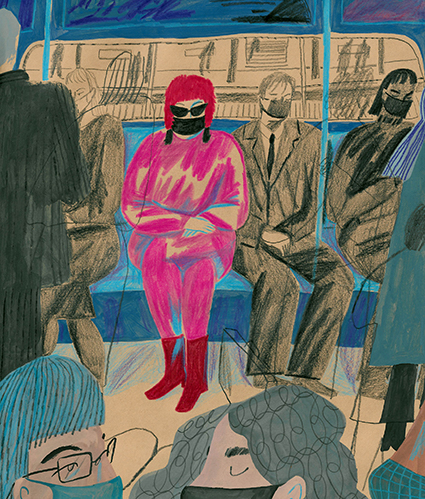
Vanity is typically seen as a vice, but it can actually be sustenance, especially for people who don’t fit within the demarcations of the Westernized beauty ideal. Think: selfie culture; the makeup tutorial boom; the social-media-led body positivity movements. I used stylishness as protection against a culture otherwise dismissive of fat women. (Sometimes we indeed get sick of relying on our personalities to ingratiate ourselves to the world.) But what does that mean now that people rarely dress up? Is there also a loss of identity stemming from this loss of vanity?
These days, I have just one persona: pallid couch slug. Where I once chose a different top for every day of the month, I now retain “this week’s shirt.” Where I used to leave my apartment with a perfect ’60s-style cat eye, I now know there’s a lot you can hide on Zoom by haphazardly smearing on lip tint. Slacks? Get real.
Some might say that this side of pandemic living is liberating. After all, I and so many others who are fortunate enough to work from home are no longer shackled to the daily grind of patriarchal beauty standards. Loungewear is in; respectability is out. Feminine personal grooming is laborious, time-consuming and expensive. In the before-times, I would bombinate with anxiety about the pitiful state of my too-short nails; the silver that would sprout within weeks of my cut-and-color appointment; the guilt over not establishing a 12-step skincare routine.
This so-called freedom from vanity, however, comes at a cost. It contributes to “pandemic dysphoria”—a kind of dysthymic depersonalization brought on by the isolation of relentless quarantine. I’ve never met a dark, reflective surface I didn’t love. (I get how Narcissus drowned.) But these days, I look in the mirror and have no idea who’s staring back at me. I do not recognize this wan, naked face. No aesthetics define this person anymore; no signifiers tether her to the corporeal world. I feel like a ghost drifting from room to room. Temporality does not exist.
Lacking a gel manicure and living with the consequences of giving myself an asymmetrical undercut with my husband’s electric razor, of course, are preposterously negligible problems compared to the true horrors of what COVID-19 has wrought around the globe. They are the mere trifling inconveniences of privilege. But I do miss feeling imbued with power and confidence—dare I say humanness—when I feel put-together in a room full of other people.
Feeling human has not always come easily to me. Growing up chubby in a family that normalized disordered eating, I developed no strong connection to my body. I felt like a brain in a jar. Fat is “slovenly.” Fat is “self-hatred.” Many bigger people experience so much verbal abuse from peers in our formative years we’re made to question, “Why even bother?,” when it comes to putting effort into our appearance. I grow tired of being told vanity is a sin when it’s a lifeline for people who have been made to feel like other. I refused to be complicit in my own erasure.
Being large is a transgression of everything my matriarchs raised me to be: delicate, ladylike, concealed. I was put on Weight Watchers at the age of 10. I was made to listen to mind-training audiotapes in the car about how to control “emotional eating.” I was incessantly corrected for not being “graceful” enough. This was how they showed their love; they knew from a lifetime of carrying their weight as a burden that my future wouldn’t be easy if I stayed big. But I stopped pretending to be a thin person waiting to be emancipated from my corpulence. My greatest revolt was realizing I actually like the way I look. But it turns out what I liked all along was being consumed via other people’s gaze.
For more than a year now, I’ve stared at my closet and watched my carefully curated wardrobe languish. (Do you know how much effort it takes to locate attractive plus-size clothing that doesn’t come in a wallpaper pattern or a beastly hue that can only be described as “magurgundy”?) I’ve had friends suggest I dress up every now and then for fun, but, frankly, if a tree puts on red lipstick and no one is around to see it, does it intimidate anyone? Instead of going out into the world looking like a Stevie Nicks woods witch, now I resemble H.G. Wells’ Invisible Man, wrapped in black sunglasses and three layers of masks. I am everything I once feared: achingly anonymous.
Bahr is a film and television critic based in Cambridge, Mass.
Illustration by Joey Yu